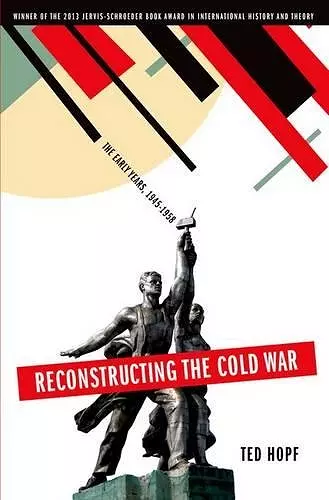Reconstructing the Cold War
The Early Years, 1945-1958
Format:Paperback
Publisher:Oxford University Press Inc
Published:17th Apr '14
Currently unavailable, and unfortunately no date known when it will be back
This paperback is available in another edition too:
- Hardback£57.00(9780199858484)

General answers are hard to imagine for the many puzzling questions that are raised by Soviet relations with the world in the early years of the Cold War. Why was Moscow more frightened by the Marshall Plan than the Truman Doctrine? Why would the Soviet Union abandon its closest socialist ally, Yugoslavia, just when the Cold War was getting under way? How could Khrushchev's de-Stalinized domestic and foreign policies at first cause a warming of relations with China, and then lead to the loss of its most important strategic ally? What can explain Stalin's failure to ally with the leaders of the decolonizing world against imperialism and Khrushchev's enthusiastic embrace of these leaders as anti-imperialist at a time of the first detente of the Cold War? It would seem that only idiosyncratic explanations could be offered for these seemingly incoherent policy outcomes. Or, at best, they could be explained by the personalities of Stalin and Khrushchev as leaders. The latter, although plausible, is incorrect. In fact, the most Stalinist of Soviet leaders, the secret police chief and sociopath, Lavrentii Beria, was the most enthusiastic proponent of de-Stalinized foreign and domestic policies after Stalin's death in March 1953. Ted Hopf argues, instead, that it was Soviet identity that explains these anomalies. During Stalin's rule, a discourse of danger prevailed in Soviet society, where any deviations from the idealized version of the New Soviet Man, were understood as threatening the very survival of the Soviet project itself. But the discourse of danger did not go unchallenged. Even under the rule of Stalin, Soviet society understood a socialist Soviet Union as a more secure, diverse, and socially democratic place. This discourse of difference, with its broader conception of what the socialist project meant, and who could contribute to it, was empowered after Stalin's death, first by Beria, then by Malenkov, and then by Khrushchev, and rest of the post-Stalin Soviet leadership. This discourse of difference allowed for the de-Stalinization of Eastern Europe, with the consequent revolts in Poland and Hungary, a rapprochement with Tito's Yugoslavia, and an initial warming of relations with China. But it also sowed the seeds of the split with China, as the latter moved in the very Stalinist direction at home just rejected by...
Ted Hopf uses a sophisticated and nuanced societal constructivist approach to illuminate Soviet understandings and motivations in the years of the Cold War. By combining discursive analysis with a serious investigation of institutions, he demonstrates that the Stalinist state discourse of capitalist danger to state socialism, which dominated in official views until Stalin's death in 1953, was replaced by an alternative discourse of difference that allowed for greater variety and tolerance within the socialist camp. Taking identities as fundamental to foreign policy, Hopf illustrates their profound effects on the choices made by the Soviet leaders. From his unique perspective, he is able to go beyond conventional neorealist accounts and lay out an original new approach to understanding the origins of the Cold War. This is a work that breaks through the impasses of old-style Sovietology and enlivens our debates and understanding. * Rondald Grigor Suny, author of The Soviet Experiment *
ISBN: 9780199379767
Dimensions: 155mm x 231mm x 20mm
Weight: 454g
320 pages